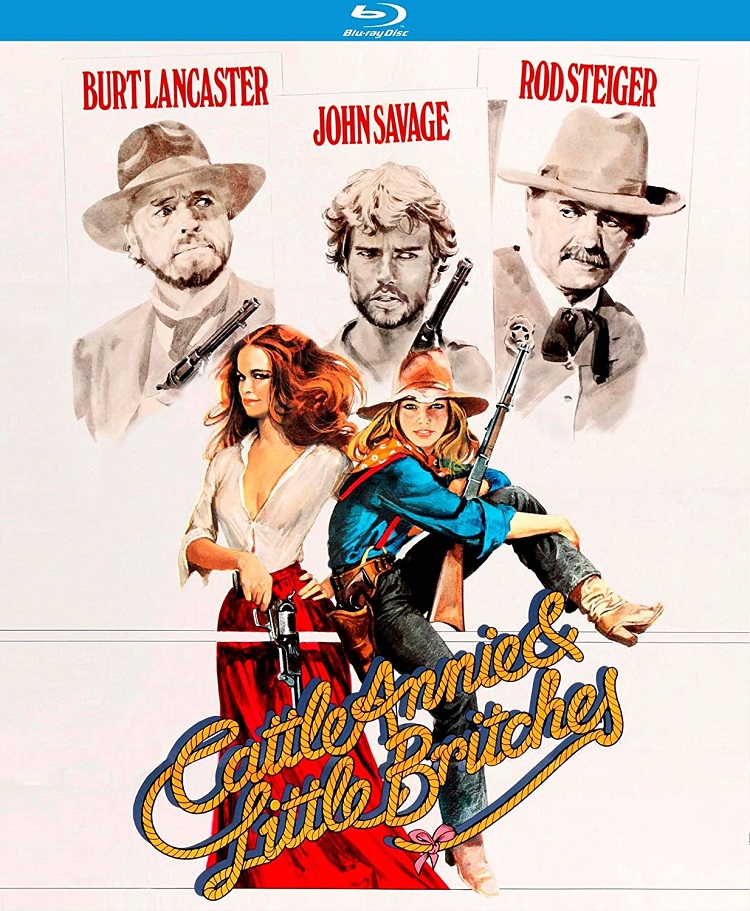
Ripe for rediscovery, Cattle Annie and Little Britches follows the exploits of the real-life titular characters, two teenage girls in love with Ned Buntline’s stories about western outlaws. Having loused up their jobs at a cantina, they soon fall in with the tired Doolin-Dalton gang, and get more than they bargained for.
Shot mostly in Durango, Mexico, the movie looks great. Colors pop. The rocky landscapes (and in one striking sequence, a dry lakebed) add texture, but not in a distracting, postcard-pretty way. Designed with care, the sets for the towns hail from Calle Howard and La Jova, Old West towns built on ranches.
Burt Lancaster plays Bill Dalton beautifully. He commands the screen. A bear of a man who refuses to rob the common folk, he’s pretty much past his prime, and knows it; but though he’s walking slow in his age—though he uses kindness and decency to get his way part of the time—he rules the gang unquestioned. Lancaster has a sureness about him. You see more than just a flash of the tough guys he used to play. He is too old for the role, but he looks like he’s having fun; there’s a light in his eyes. And his tenderness with Little Britches (Diane Lane), never cloying, feels sincere.
Cattle Annie (Amanda Plummer) and Little Britches have chemistry. The older but no less daring of the two, Cattle Annie is a young woman, more than slightly interested in the opposite sex. Full of vim and vigor. Little Britches, by comparison, is no slouch, but you can see the child within, the sweetness; the sense that she is out of her depth and knows it. Wisely, the filmmakers give the girls plenty of heroics without turning them into blow-dried superheroes; without foisting caricatures of devil-may-care rowdiness on us. At the end of the film, you feel a combination of relief and disappointment. Relieved the ride is over, but a bit sad, too—how, we imagine, the girls themselves must have felt. Even though their time with the gang was short and not without its pleasures—even though they wanted a different outcome—they know how lucky they were to have had both sides of the law look out for them the way they did.
You savor the richness of the supporting cast. Stone-faced, reminding me of a young David Carradine, Scott Glenn plays Little Bill Doolin. Second fiddle to Dalton, he has little to do (I kept waiting for him to wrest control of the gang from Dalton), but it’s a bit part. He conveys a lot in a short amount of time; his loyalty to the older man muzzles him. William Russ of Cruising, The Right Stuff, and many TV shows (not to mention Beer, a so-bad-it’s-good comedy) plays Little Dick Raidler. He’s equally magnetic; he has a wild, ragged touch. You feel as though you’re watching an actor on the cusp of matinee idol stardom (which never happened). John Savage, most notable for his part in The Deer Hunter, plays Bittercreek Newcomb, a swarthy loner Cattle Annie fancies. Runty in the other roles I’ve seen him in, Savage has a lean, man-of-few-words steeliness here, a quiet watchfulness. Then there is Rod Steiger, who makes a solid U.S. Marshall Bill Tilghman. Thankfully, Steiger doesn’t chew his lines or get too broad here. Pitched to the film’s tone, he gets the paternal, world-weary aspect of his character exactly right. (Dalton and Tilghman have a showdown of sorts, but do not spar so much as threaten to, old dogs as tired of the chase as they are juiced from it.) Everyone comports themselves well in the film.
But Plummer walks away with the picture. Her stubbornness, her determination to be a crucial part of something she’s always dreamt of, jolts the gang just when they need it most. She’s electric. And she tears into the role without showboating; without making it seem like she’s tuned to a different frequency than the film is. I’d be surprised if director Quentin Tarantino hadn’t thought of her performance when he prepped Pulp Fiction.
Cattle Annie and Little Britches is not a movie-movie experience. Visually, the story does not seem to possess director Lamont Johnson; it doesn’t seem like the passion project of a stylish auteur. It’s just a smart B-movie with a soft core. The action scenes work (I especially like the prison break and the last-ditch ride into the hills), but Johnson’s heart is in the small moments where characters interact. He keeps things light, keeps them simple; but the film doesn’t get cute. It also doesn’t spill over into anti-authoritarian swagger or the dark but balletic slaughter of a Sam Peckinpah oater. This is a family western with some rough edges. It sits in the shade of a bittersweet mix of sentiment and a dry-eyed regard for broken dreams and hard living. I think it’s a good film. There is a more worn, morally dubious film inside it somewhere, but what it does it does well indeed.
Made in 1979, the movie made about half a million on a five-million budget. As producer Rupert Hitzig explains in an interview on the Blu-ray, Universal Pictures dumped the film in 1981, after about a week’s run in New York. It never saw a proper release. Heaven’s Gate, a United Artists feature, had just bombed, and the distributor got cold feet, thinking westerns were suddenly cinema non grata.
That’s too bad. Cattle Annie and Little Britches is a sleeper. Not a gem, exactly, but a perfectly passable way to spend 97 minutes. I even like the title tune that plays over the credits and the Blu-ray menu. It’s got a funky, scratchy vibe, a cross between Quarterflash and late ’70s Linda Ronstadt. (I found myself humming along as I cleaned the dishes one night.)
Light on features, the Kino Lorber Studio Classics Blu-ray sports the theatrical trailer and the interview with Hitzig.